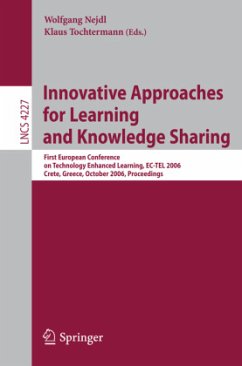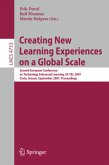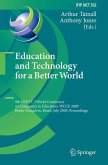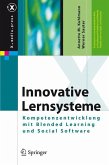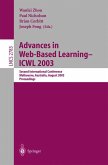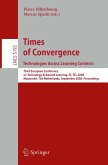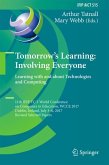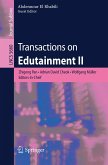Wolfgang Nejdl / Klaus Tochtermann (eds.)First European Conference on Technology Enhanced Learning, EC-TEL 2006, Crete, Greece, October 1-4, 2006, Proceedings
Innovative Approaches for Learning and Knowledge Sharing
First European Conference on Technology Enhanced Learning, EC-TEL 2006, Crete, Greece, October 1-4, 2006, Proceedings
Herausgegeben:Nejdl, Wolfgang; Tochtermann, Klaus
Wolfgang Nejdl / Klaus Tochtermann (eds.)First European Conference on Technology Enhanced Learning, EC-TEL 2006, Crete, Greece, October 1-4, 2006, Proceedings
Innovative Approaches for Learning and Knowledge Sharing
First European Conference on Technology Enhanced Learning, EC-TEL 2006, Crete, Greece, October 1-4, 2006, Proceedings
Herausgegeben:Nejdl, Wolfgang; Tochtermann, Klaus
- Broschiertes Buch
- Merkliste
- Auf die Merkliste
- Bewerten Bewerten
- Teilen
- Produkt teilen
- Produkterinnerung
- Produkterinnerung
This book constitutes the refereed proceedings of the First European Conference on Technology Enhanced Learning, EC-TEL 2006. The book presents 32 revised full papers, 13 revised short papers and 31 poster papers together with 2 keynote talks. Topics addressed include collaborative learning, personalized learning, multimedia content, semantic web, metadata and learning, workplace learning, learning repositories and infrastructures for learning, as well as experience reports, assessment, and case studies, and more.
Andere Kunden interessierten sich auch für
![Creating New Learning Experiences on a Global Scale Creating New Learning Experiences on a Global Scale]() Erik Duval (Volume ed.) / Ralf Klamma / Martin WolpersCreating New Learning Experiences on a Global Scale38,99 €
Erik Duval (Volume ed.) / Ralf Klamma / Martin WolpersCreating New Learning Experiences on a Global Scale38,99 €![Education and Technology for a Better World Education and Technology for a Better World]() Education and Technology for a Better World75,99 €
Education and Technology for a Better World75,99 €![Innovative Lernsysteme Innovative Lernsysteme]() Annette KuhlmannInnovative Lernsysteme84,99 €
Annette KuhlmannInnovative Lernsysteme84,99 €![Advances in Web-Based Learning -- ICWL 2003 Advances in Web-Based Learning -- ICWL 2003]() ZhouAdvances in Web-Based Learning -- ICWL 200381,99 €
ZhouAdvances in Web-Based Learning -- ICWL 200381,99 €![Times of Convergence. Technologies Across Learning Contexts Times of Convergence. Technologies Across Learning Contexts]() Times of Convergence. Technologies Across Learning Contexts38,99 €
Times of Convergence. Technologies Across Learning Contexts38,99 €![Tomorrow's Learning: Involving Everyone. Learning with and about Technologies and Computing Tomorrow's Learning: Involving Everyone. Learning with and about Technologies and Computing]() Tomorrow's Learning: Involving Everyone. Learning with and about Technologies and Computing76,99 €
Tomorrow's Learning: Involving Everyone. Learning with and about Technologies and Computing76,99 €![Transactions on Edutainment II Transactions on Edutainment II]() Transactions on Edutainment II38,99 €
Transactions on Edutainment II38,99 €-
-
-
This book constitutes the refereed proceedings of the First European Conference on Technology Enhanced Learning, EC-TEL 2006. The book presents 32 revised full papers, 13 revised short papers and 31 poster papers together with 2 keynote talks. Topics addressed include collaborative learning, personalized learning, multimedia content, semantic web, metadata and learning, workplace learning, learning repositories and infrastructures for learning, as well as experience reports, assessment, and case studies, and more.
Hinweis: Dieser Artikel kann nur an eine deutsche Lieferadresse ausgeliefert werden.
Hinweis: Dieser Artikel kann nur an eine deutsche Lieferadresse ausgeliefert werden.
Produktdetails
- Produktdetails
- Lecture Notes in Computer Science 4227
- Verlag: Springer / Springer Berlin Heidelberg / Springer, Berlin
- Artikelnr. des Verlages: 11876663, 978-3-540-45777-0
- 2006
- Seitenzahl: 744
- Erscheinungstermin: 22. September 2006
- Englisch
- Abmessung: 235mm x 155mm x 40mm
- Gewicht: 1084g
- ISBN-13: 9783540457770
- ISBN-10: 3540457771
- Artikelnr.: 20946620
- Herstellerkennzeichnung Die Herstellerinformationen sind derzeit nicht verfügbar.
- Lecture Notes in Computer Science 4227
- Verlag: Springer / Springer Berlin Heidelberg / Springer, Berlin
- Artikelnr. des Verlages: 11876663, 978-3-540-45777-0
- 2006
- Seitenzahl: 744
- Erscheinungstermin: 22. September 2006
- Englisch
- Abmessung: 235mm x 155mm x 40mm
- Gewicht: 1084g
- ISBN-13: 9783540457770
- ISBN-10: 3540457771
- Artikelnr.: 20946620
- Herstellerkennzeichnung Die Herstellerinformationen sind derzeit nicht verfügbar.
Klaus Tochtermann lehrt an der TU Graz und leitet das Institut für Vernetzte Medien bei JOANNEUM RESEARCH in Graz.
Keynotes.- From Clicks to Touches: Enabling Face-to-Face Shared Interface.- Innovating eLearning and Mobile Learning Technologies for Europe's Future Educational Challenges, Theory and Case Studies.- Full Papers.- Considering Human Memory Aspects for Adaptation and Its Realization in AHA!.- Creating and Delivering Adaptive Courses with AHA!.- Awareness and Collaboration in the iHelp Courses Content Management System.- Interoperability for Peer-to-Peer Networks: Opening P2P to the Rest of the World.- Promoting Teachers' Collaborative Re-use of Educational Materials.- A Formal Model of Learning Object Metadata.- Automatic and Manual Annotation Using Flexible Schemas for Adaptation on the Semantic Desktop.- eMapps.com: Games and Mobile Technology in Learning.- Bayesian Student Models Based on Item to Item Knowledge Structures.- Towards Community-Driven Development of Educational Materials: The Edukalibre Approach.- Is There a Way to e-Bologna? Cross-National Collaborative Activities in University Courses.- Ontological Support for a Theory-Eclectic Approach to Instructional and Learning Design.- Explicit Referencing in Learning Chats: Needs and Acceptance.- Integrating Learning Object Repositories Using a Mediator Architecture.- Guided and Interactive Factory Tours for Schools.- Adult Learners and ICT: An Intervention Study in the UK.- Community Aware Content Adaptation for Mobile Technology Enhanced Learning.- Pattern-Based Cross Media Social Network Analysis for Technology Enhanced Learning in Europe.- User Effect in Evaluating Personalized Information Retrieval Systems.- Data and Application Integration in Learning Content Management Systems: A Web Services Approach.- Using Virtual Learners' Behaviours to Help the Development of Educational Business Games.- AMechanism to Support Context-Based Adaptation in M-Learning.- Production and Deployment of Educational Videogames as Assessable Learning Objects.- Two Technology-Enhanced Courses Aimed at Developing Interpersonal Attitudes and Soft Skills in Project Management.- Developing Collaborative Virtual Learning Community for the Korean Community Health Practitioners.- Simulation as Efficient Support to Learning Business Dynamics.- MD2 Method: The Didactic Materials Creation from a Model Based Perspective.- DynMap+: A Concept Mapping Approach to Visualize Group Student Models.- Knowledge Management in Schools - From Electronic Schoolbag to Social Software.- Satellite-Enabled Interactive Education: Scenarios and Systems Architectures.- Motivational Effects Within Scientific Experimentation Scenarios.- Getting to Know Your Student in Distance Learning Contexts.- Short Papers.- The L2C Project: Learning to Collaborate Through Advanced SmallWorld Simulations.- Integrating Instructional Material and Teaching Experience into a Teachers' Collaborative Learning Environment.- A Neural Approach for Modeling the Inference of Awareness in Computer-Supported Collaboration.- An Exploratory Study of the Relationship Between Learning Styles and Cognitive Traits.- Automatic Semantic Activity Monitoring of Distance Learners Guided by Pedagogical Scenarios.- Electronic Portfolios as a Means for Initializing Learner Models for Adaptive Tutorials.- New Media for Teaching Applied Cryptography and Network Security.- Initiating Technology-Enhanced Learning at a Public-Sector Institution in a Developing Country.- Requirements and an Architecture for a Multimedia Content Re-purposing Framework.- Developing a Reference Model to Describe the Personal Learning Environment.- Semantic Modelling ofLearning Objects and Instruction.- Context-Aware Workplace Learning Support: Concept, Experiences, and Remaining Challenges.- A Context-Model for Supporting Work-Integrated Learning.- Posters.- Made-to-Measure Learning Materials.- The Problem of LD Execution and the Need for an IMS LD Level B Ontology.- Taking Teaching Context into Account for Semantic Annotation Patterns.- Designing a Constructionistic Framework for T-Learning.- Advanced Personalized Learning and Training Applications Through Mobile Technologies and Services.- COOPER: Towards a Collaborative Open Environment of Project-Centred Learning.- Design of Web-Based Financial Learning Environment.- Towards an Effective Instructional Engineering Analysis Method.- The LEAD Project: Computer Support for Face-to-Face Collaborative Learning.- On-Campus Blended Learning: Using Discussion Forums for Peer Collaboration on Tutorial Assignments.- Semantic Positioning as a Means for Visual Knowledge Structuring.- Time2Competence: The PROLIX Project.- Design Principles and Practices for the Knowledge-Practices Laboratory (KP-Lab) Project.- Knowledge Fusion: A New Method to Share and Integrate Distributed Knowledge Sources.- Ontologies to Support Learning Design Context.- TENCompetence: Lifelong Learning and Competence Development.- A Storyboard of the APOSDLE Vision.- Blended Learning Technologies in Lifelong Education: Lessons Learned from a Case Study.- iCamp - The Educational Web for Higher Education.- The Study on Effective Programming Learning Using Wiki Community Systems.- Analysing Graphic-Based Electronic Discussions: Evaluation of Students' Activity on Digalo.- LeActiveMath.- Language Technology for eLearning.- An Approach for Online Assessment in the Multinational EU Project: POOL Project OrganizationOnLine.- Extending SCORM to Create Adaptive Courses.- The AtGentive Project: Attentive Agents for Collaborative Learners.- Meaningful Pedagogy Via Covering the Entire Life Cycle of Adaptive eLearning in Terms of a Pervasive Use of Educational Standards: The aLFanet Experience.- A Context-Aware Service Oriented Framework for Finding, Recommending and Inserting Learning Objects.- Trialogical E-Learning and Emergent Knowledge Artifacts.- ARiSE - Augmented Reality in School Environments.- Professional Learning in Europe and Beyond Structures for Sustainable TEL-Research.
Keynotes.- From Clicks to Touches: Enabling Face-to-Face Shared Interface.- Innovating eLearning and Mobile Learning Technologies for Europe's Future Educational Challenges, Theory and Case Studies.- Full Papers.- Considering Human Memory Aspects for Adaptation and Its Realization in AHA!.- Creating and Delivering Adaptive Courses with AHA!.- Awareness and Collaboration in the iHelp Courses Content Management System.- Interoperability for Peer-to-Peer Networks: Opening P2P to the Rest of the World.- Promoting Teachers' Collaborative Re-use of Educational Materials.- A Formal Model of Learning Object Metadata.- Automatic and Manual Annotation Using Flexible Schemas for Adaptation on the Semantic Desktop.- eMapps.com: Games and Mobile Technology in Learning.- Bayesian Student Models Based on Item to Item Knowledge Structures.- Towards Community-Driven Development of Educational Materials: The Edukalibre Approach.- Is There a Way to e-Bologna? Cross-National Collaborative Activities in University Courses.- Ontological Support for a Theory-Eclectic Approach to Instructional and Learning Design.- Explicit Referencing in Learning Chats: Needs and Acceptance.- Integrating Learning Object Repositories Using a Mediator Architecture.- Guided and Interactive Factory Tours for Schools.- Adult Learners and ICT: An Intervention Study in the UK.- Community Aware Content Adaptation for Mobile Technology Enhanced Learning.- Pattern-Based Cross Media Social Network Analysis for Technology Enhanced Learning in Europe.- User Effect in Evaluating Personalized Information Retrieval Systems.- Data and Application Integration in Learning Content Management Systems: A Web Services Approach.- Using Virtual Learners' Behaviours to Help the Development of Educational Business Games.- AMechanism to Support Context-Based Adaptation in M-Learning.- Production and Deployment of Educational Videogames as Assessable Learning Objects.- Two Technology-Enhanced Courses Aimed at Developing Interpersonal Attitudes and Soft Skills in Project Management.- Developing Collaborative Virtual Learning Community for the Korean Community Health Practitioners.- Simulation as Efficient Support to Learning Business Dynamics.- MD2 Method: The Didactic Materials Creation from a Model Based Perspective.- DynMap+: A Concept Mapping Approach to Visualize Group Student Models.- Knowledge Management in Schools - From Electronic Schoolbag to Social Software.- Satellite-Enabled Interactive Education: Scenarios and Systems Architectures.- Motivational Effects Within Scientific Experimentation Scenarios.- Getting to Know Your Student in Distance Learning Contexts.- Short Papers.- The L2C Project: Learning to Collaborate Through Advanced SmallWorld Simulations.- Integrating Instructional Material and Teaching Experience into a Teachers' Collaborative Learning Environment.- A Neural Approach for Modeling the Inference of Awareness in Computer-Supported Collaboration.- An Exploratory Study of the Relationship Between Learning Styles and Cognitive Traits.- Automatic Semantic Activity Monitoring of Distance Learners Guided by Pedagogical Scenarios.- Electronic Portfolios as a Means for Initializing Learner Models for Adaptive Tutorials.- New Media for Teaching Applied Cryptography and Network Security.- Initiating Technology-Enhanced Learning at a Public-Sector Institution in a Developing Country.- Requirements and an Architecture for a Multimedia Content Re-purposing Framework.- Developing a Reference Model to Describe the Personal Learning Environment.- Semantic Modelling ofLearning Objects and Instruction.- Context-Aware Workplace Learning Support: Concept, Experiences, and Remaining Challenges.- A Context-Model for Supporting Work-Integrated Learning.- Posters.- Made-to-Measure Learning Materials.- The Problem of LD Execution and the Need for an IMS LD Level B Ontology.- Taking Teaching Context into Account for Semantic Annotation Patterns.- Designing a Constructionistic Framework for T-Learning.- Advanced Personalized Learning and Training Applications Through Mobile Technologies and Services.- COOPER: Towards a Collaborative Open Environment of Project-Centred Learning.- Design of Web-Based Financial Learning Environment.- Towards an Effective Instructional Engineering Analysis Method.- The LEAD Project: Computer Support for Face-to-Face Collaborative Learning.- On-Campus Blended Learning: Using Discussion Forums for Peer Collaboration on Tutorial Assignments.- Semantic Positioning as a Means for Visual Knowledge Structuring.- Time2Competence: The PROLIX Project.- Design Principles and Practices for the Knowledge-Practices Laboratory (KP-Lab) Project.- Knowledge Fusion: A New Method to Share and Integrate Distributed Knowledge Sources.- Ontologies to Support Learning Design Context.- TENCompetence: Lifelong Learning and Competence Development.- A Storyboard of the APOSDLE Vision.- Blended Learning Technologies in Lifelong Education: Lessons Learned from a Case Study.- iCamp - The Educational Web for Higher Education.- The Study on Effective Programming Learning Using Wiki Community Systems.- Analysing Graphic-Based Electronic Discussions: Evaluation of Students' Activity on Digalo.- LeActiveMath.- Language Technology for eLearning.- An Approach for Online Assessment in the Multinational EU Project: POOL Project OrganizationOnLine.- Extending SCORM to Create Adaptive Courses.- The AtGentive Project: Attentive Agents for Collaborative Learners.- Meaningful Pedagogy Via Covering the Entire Life Cycle of Adaptive eLearning in Terms of a Pervasive Use of Educational Standards: The aLFanet Experience.- A Context-Aware Service Oriented Framework for Finding, Recommending and Inserting Learning Objects.- Trialogical E-Learning and Emergent Knowledge Artifacts.- ARiSE - Augmented Reality in School Environments.- Professional Learning in Europe and Beyond Structures for Sustainable TEL-Research.

